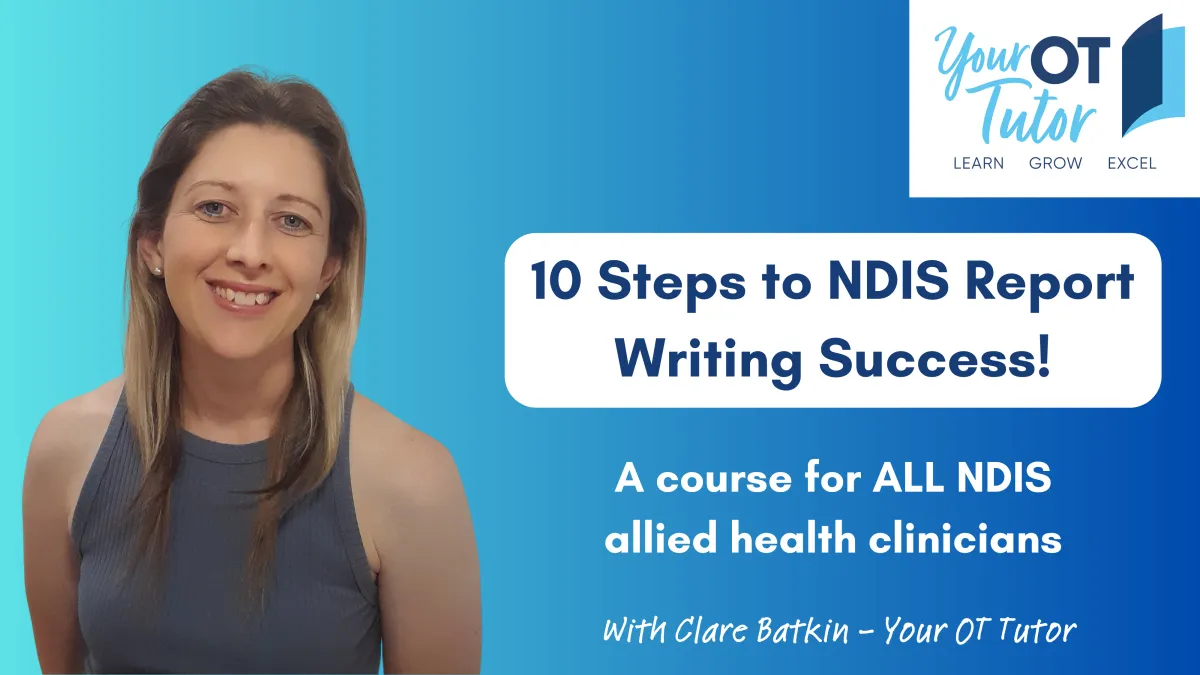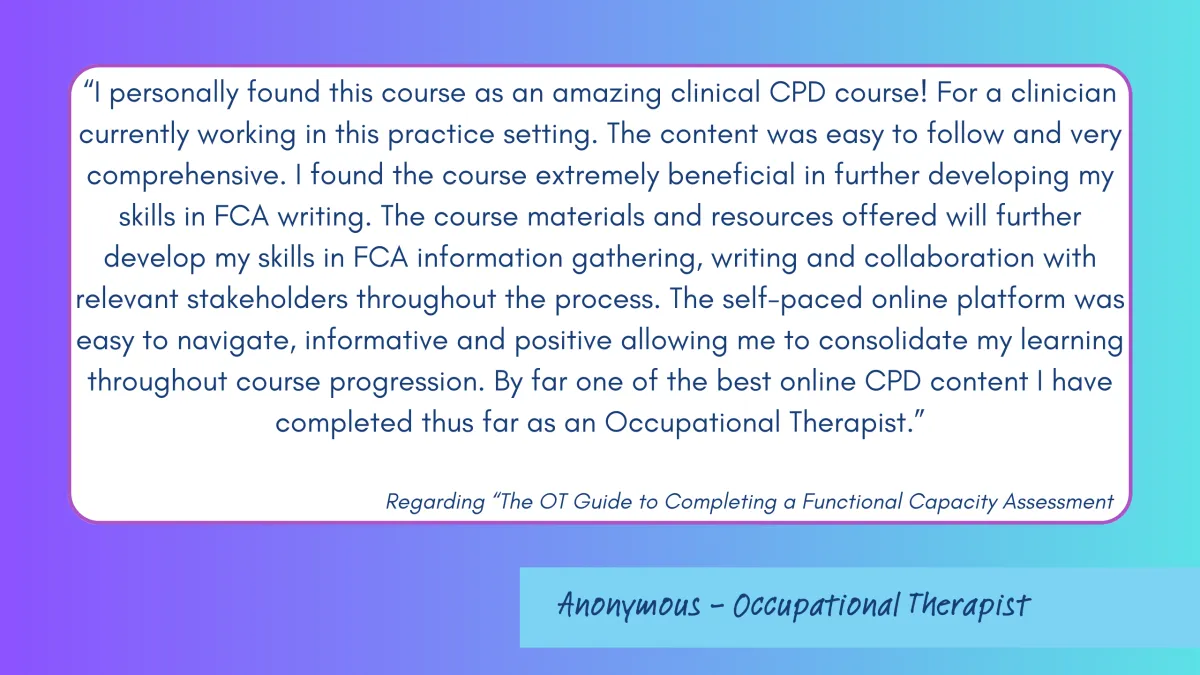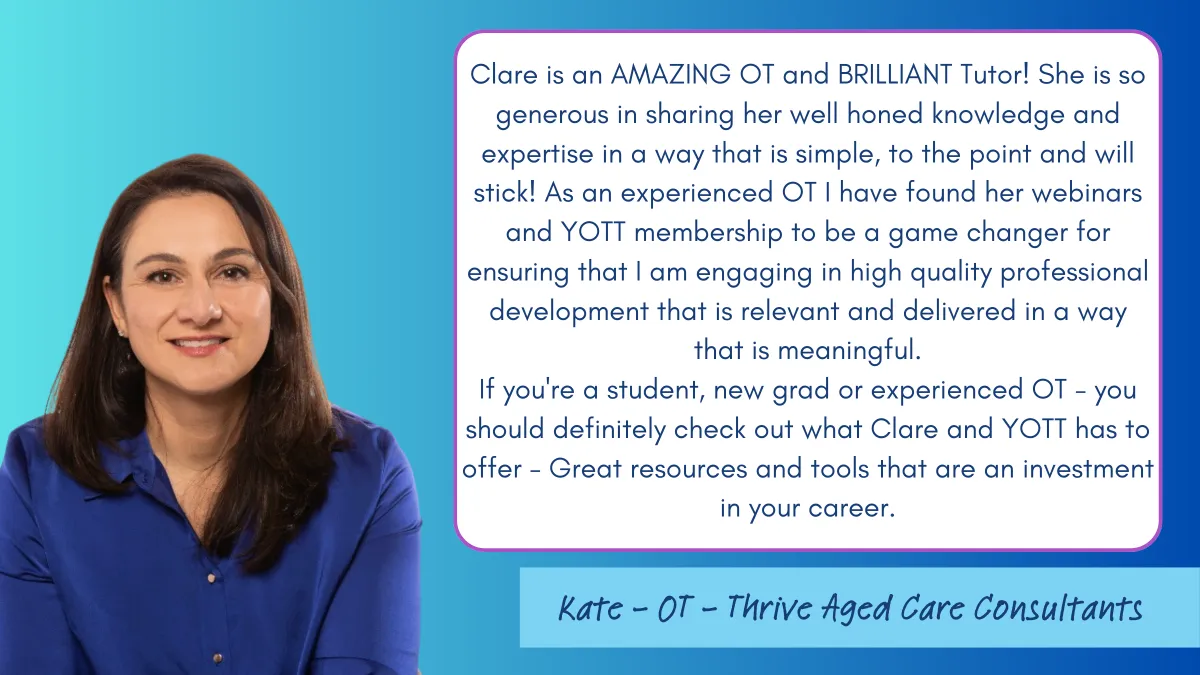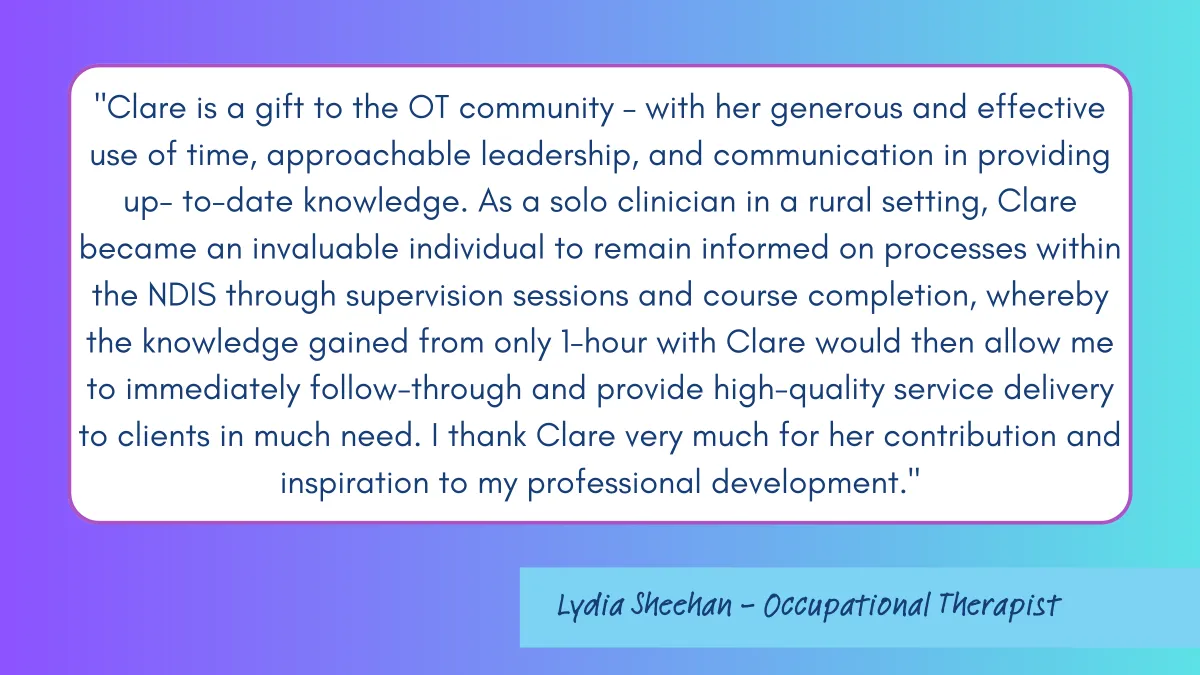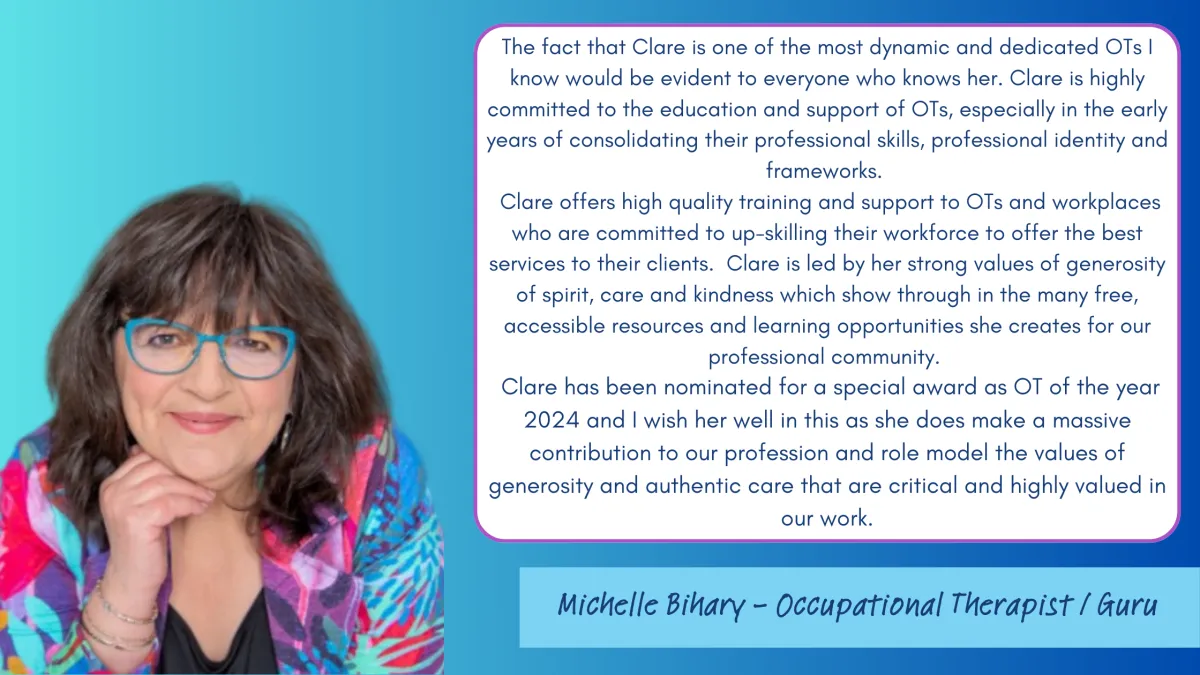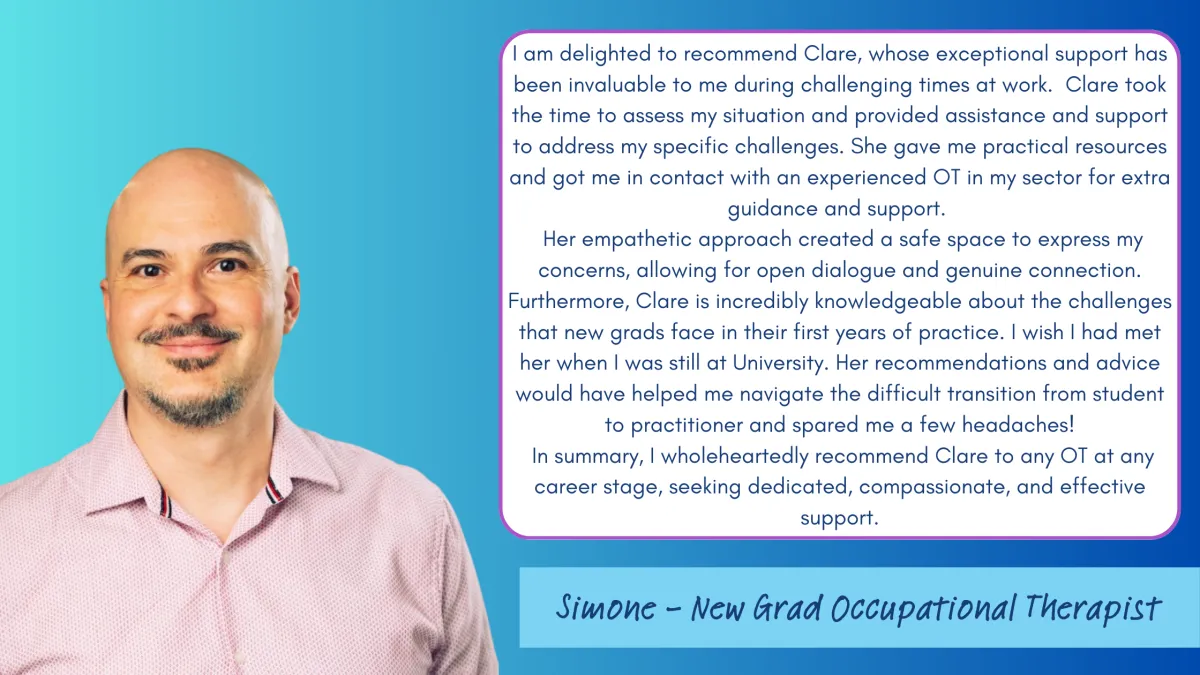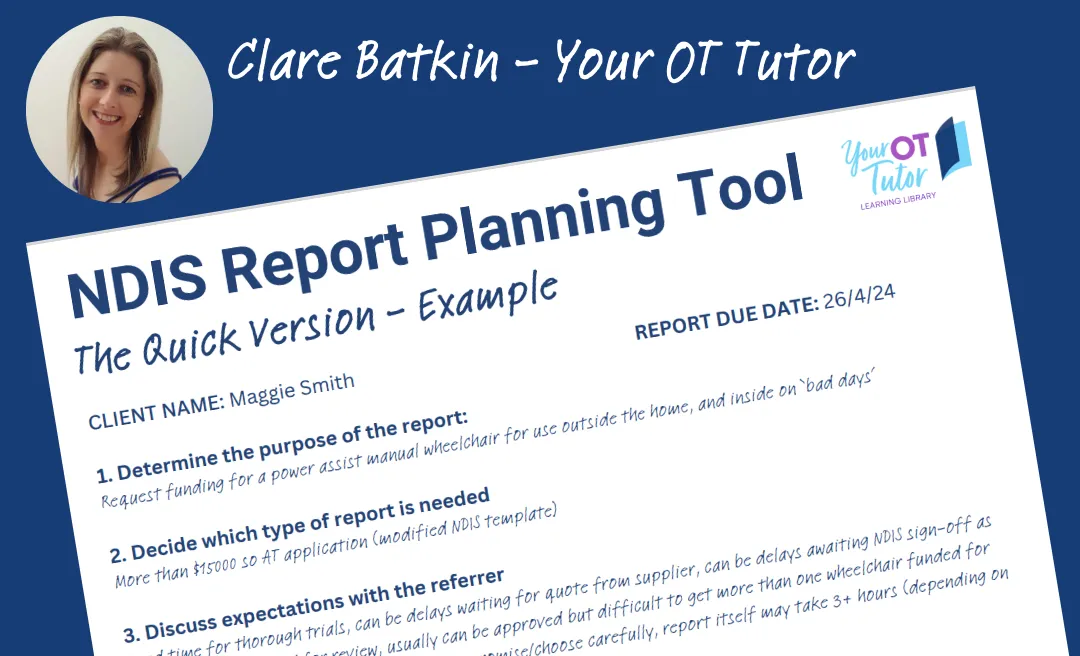
Are you an allied health clinician struggling with NDIS report writing? I’ve got something that will help…
Do you know the 10 Steps to NDIS Report Writing Success?
Learn a step-by-step process for completing comprehensive and clear NDIS reports to give your clients the best chance possible of funding success.
NDIS report writing is tough for all allied health clinicians!
The goal posts keep changing in terms of what we can and can’t recommend.
There is no consistency between what will be funded and what won’t be funded.
We can pour our hearts into writing a detailed report with every piece of evidence we can think of, only to have the NDIA planner say “there’s not enough evidence.”
And a lot of the time our reports aren’t even read and you start to think “what’s the point!?”
All this can leave you feeling frustrated, uncertain, and doubting whether you are doing a good job or not.
If you’ve been nodding along, this course is for you!
Have you signed up for other NDIS CPD, but you're still feeling lost?
This CPD is different!
Often report writing courses are targeted around the writing itself – tips and tricks to make the NDIA listen to you and like your reports.
These are helpful, but it won’t address the key gap that is often missing from NDIS reports – the information gathering.
In this course you need to complete 6 steps before you even get to worrying about how to write things.
It starts with having a clear understanding of the purpose of the report, and what functional outcomes the support you are requesting will help the participant achieve.
Then you need to collect robust evidence from a range of sources, so when your recommendations are rejected or you are asked for more details, you’re ready.
You know what you are recommending and why, and how you know it is the right option for this participant.
This is the benefit of learning from an experienced clinical educator – you’ll get the step-by-step big picture, not just the tips for the quick wins.
And there will be case studies and activities throughout to help you apply what you are learning straight away.
But what will I learn?
The on-demand content will help you develop a range of skills that will be useful when working with an NDIS caseload.
You’ll be able to:
1. Determine the purpose of the report
2. Decide which type of report is needed
3. Discuss expectations with the referrer
4. Gather your evidence
5. Check your reasoning and determine recommendations
6. Understand your audience
7. Explain your reasoning
8. Maximise clarity
9. Review report and incorporate feedback
10. Submit the report (but you're not done yet...)
You'll also feel more confident in your approach so if the NDIA does knock back your request, you will be in a strong position to fight it.
This course will help you:
Understand the power of having a clear purpose in mind before you start writing - what functional outcome are you helping your client achieve with the report?
Avoid uncomfortable conversations with the referrer over the cost of the report - you'll learn to cover this before you start any writing
You'll understand the importance of using a range of information gathering methods, so the evidence you provide to the NDIA will be stronger
Paint a clear picture of your client's function, so the planner can fully understand what you are recommending and why
Remember to check for feedback so that each report gets better and easier
Need some social proof to take the plunge?
MEET YOUR INSTRUCTOR - CLARE BATKIN!
So why should you learn with Clare?
I’m a proud #OT Nerd who is on a mission to make learning accessible and enjoyable for all OTs so you can improve your competence and confidence and deliver high quality services to your clients.
Here’s a little about me:
I’ve worked as an OT for over 15 years across public and private sectors, in both hospital and community settings.
I’ve worked across lots of different caseloads, including aged care, orthopaedics, burns, hand therapy, neurosciences, surgical, medical, mental health and more.
I work as a sessional academic at a university and have supervised many students and new grads (so I can help you connect the dots between what they teach you at uni and what you need to know to be a great OT).
I've completed independent OT assessments for NDIS participants contesting decisions at the AAT (now ART)
I provide supervision and report review services on NDIS report writing for a number of OTs and allied health professionals – I’ve seen the good, the bad and the ugly when it comes to NDIS reports.
I'm a busy working mum - I know CPD has to be accessible, affordable and impactful!
I’ve got 12,800+ followers on LinkedIn from around the world (my content is relevant and helpful to lots of OTs!)
4000 people have signed up to access my resources, webinars and courses in under two years.
In 2024 I was a finalist for Occupational Therapist of the Year at the Allied Health Awards!!

THE COURSE CONTENT
When you sign-up to the course here’s what you get:
Fully online, on-demand, self-paced content that you can access 24/7 via your laptop or the mobile app
No zoom links that will expire! Everything is setup in a Learning Management System where you can track your progress and revisit content as often as you want
3.5 hours of CPD
Lots of downloadable resources including a NDIS Report Planning Tool
A comprehensive workbook with all the PowerPoint slides and case study questions
Transcript of the content (for those that like to read along and highlight)
6 months access (option to extend if needed)
Completion certificate and CPD reflection template
Here are some of the key learning outcomes you’ll achieve:
How to complete an NDIS report in a systematic way
What types of NDIS reports are out there
How you should gather the evidence needed for your report
What language you should use in your reports
What essential information the NDIS planners will be looking for
What formatting will enhance clarity and maximise the chances that someone will actually read the report!
When and how to use feedback from others to improve your report
What you should do to follow-up the outcome of your report
Here’s some more detail about each of the 10 steps:
1. Determine the purpose of the report – Have a clear understanding of what functional outcome you are hoping to achieve for your client.
2. Decide which type of report is needed – There are lots of different types of NDIS reports! Do you need an FCA, AT Application, Home and Living report, support letter or something else?
3. Discuss expectations with the referrer – Make sure they know what type of report you are doing, how long it will take and what you will be billing for before you get started.
4. Gather your evidence – You need evidence from a range of sources, including interview, observations, liaison with others and standardised assessments. But how do you know which ones to choose?
5. Check your reasoning and determine recommendations – Have you considered the reasonable and necessary criteria and NDIS support lists?
6. Understand your audience – Visualise an NDIA planner! What is their health and disability training, and what are their drivers and KPIs?
7. Explain your reasoning – Your recommendations make sense to you, but will they make sense to someone who doesn’t know your client? Explain your justifications by using appropriate language and presenting information clearly.
8. Maximise clarity – These are the writing tips! Include the right content and use the right formatting so the NDIA planner wants to read your report and will find the key information you need them to see.
9. Review report and incorporate feedback – Another set of eyes can make a difference! Get a supervisor or peer to review your work and make sure your client knows what your final recommendations will be before submitting the report.
10. Submit the report (but you’re not done yet) – You may never want to think about that epic report again once it’s done, but that’s not a good option. Remember to follow-up the outcome of the report to see if it was successful and update your own processes and templates for a smoother run next time.
THE BONUSES!
Webinar recording: Beyond Burnout - Towards Personal and Professional Resilience
Downloadable resources: Clinical handover, home visits, YOTT reflection template, Using AI as a Health Professional
Access your content via a Learning Management System –
everything in one place via one login, using your laptop or the free mobile app.
Learn with an experienced educator who will deliver
practical strategies and resources so you can apply what you learn straight away.
REMIND ME WHAT I'M GETTING...
A step-by-step approach for completing clear and comprehensive NDIS reports
NDIS Report Planning Tool, so you never skip the important steps at the beginning!
Convenient 24/7 access via a learning management system on your laptop or mobile app – one login, no lost recording links!
Bonus burnout webinar recording and downloadable resources
The satisfaction that you’re learning from an experienced clinical educator who has provided support to lots of allied health clinicians struggling with getting successful outcomes from their NDIS reports.
Check out the video for a sneak peek from the course...
All this for only $129!!
Remember this course is relevant for all Allied Health clinicians!
The framework has been tested with occupational therapists, physiotherapists, speech pathologists, and exercise physiologists and it is relevant for all of them.
FREQUENTLY ASKED QUESTIONS
How long will I have to access the content?
You will have access to the online course for 6 months, but if life happens and you need longer, let me know and I may be able to extend it. Access to the burnout webinar recording and downloadable resources won't expire.
Is this content relevant for all allied health clinicians?
Yes! While I’m an OT myself, I have written this course with all allied health in mind. I’ve reviewed the 10 steps to report writing success with physiotherapists, speech pathologists and exercise physiologists and the framework is relevant to any allied health clinician who writes NDIS reports. There are examples relevant to working with people with physical impairments, psychosocial disability, and both adults and paediatrics.
There have been lots of NDIS changes lately - will this course cover those?
The majority of the content in this course is still applicable after the latest NDIS changes, although some activities or case studies may contain examples or website links that are no longer applicable (or the details may have changed slightly). For now, written details have been provided alongside the course videos regarding how any presented content may vary, however, some updated recordings will be added over the coming months, once the NDIA have completed their own updates (we’re still awaiting new operational guidelines and the “Would we fund it” pages are still being updated). You will be able to access these course updates when they are available, without having to pay additional fees. In the meantime, if you have specific questions related to a new NDIS rule, you can use the course discussion board to ask.
Will this course teach me everything I need to know to write a perfect NDIS report?
Unfortunately not, no course could do that (if it says it can the creators are fibbing!). The NDIS is a challenging sector to work in. Courses like this can provide you with foundational skills and knowledge to help you increase your confidence and competence, but they can't teach you everything you need to know. Throughout the course content it is recommended you engage with a clinical supervisor who can help you implement what you have learnt in the courses to your own caseload. If you don't have access to a supervisor, get in touch and I can send you some suggestions for who would be most suitable for your needs.
If I do this course, will it guarantee that my recommendations will be approved?
Unfortunately not. NDIA funding decisions are often inconsistent and unclear, and it is not possible to guarantee success as decisions are made on a subjective basis. Completing this course will help you feel more confident in your own reasoning though, so if your recommendations are declined, you have the perfect starting point to decide whether the decision is one you and your client should challenge.
Can I share my login access with someone else?
Unfortunately not – this price is for one OT only. If you want to sign-up a team of OTs, get in touch and ask about my corporate bundle discounts for bulk sign-ups.
Do I have to pay for the mobile app?
No, the mobile app is free! You’ll receive details about how to download it and get started once you sign-up.
Still not convinced and need some more previews?
Here you go!
Would you like a sneak peek at one of the resources that comes with the course?
When you buy the course, you get access to this comprehensive NDIS report planning tool to take you through the process one step at a time. Watch the video for a quick preview.
INTERESTED IN ACCESSING MORE OCCUPATIONAL THERAPY RESOURCES, COURSES, BLOGS, TIPS AND LEARNING OPPORTUNITIES?
Turns out this course isn't for you? You can still sign-up to the Your OT Tutor Mailing List to be informed when other resources are available.
TESTIMONIALS
Clare, with this course you've really set the industry standard. I've completed just about every course on FCA for OT's out there and this is by far the most in-depth, presented in such a systematic and clear way - the effort you've put into making this course is abundantly clear, and honestly I'm so grateful that you've created this to kindly share with your professional network. This course gets a solid 5/5 for me - thank you so so much! :)
Anonymous Occupational Therapist
As a busy practice owner, I’ve absolutely loved having this resource available for my new grads . Even though I’ve got plenty of my own guides and sample FCA reports to share with them , what I lack is time to sit down and go through these step by step to make sure they truly understand the process. The 8 hours worth of online learning has been a massive investment for me and a valuable resource for my team. Thank you Clare Batkin!
Angie C. - Director and Occupational Therapist
Clare has been an invaluable resource for me as a new graduate OT - I regularly check her business page: Your OT Tutor and have recommended my colleagues do the same for easy to digest updates and tips! Clare has gone out of her way to assist me with my CPD portfolio and provided me with such a helpful template to use (a life saver!). Clare is extremely helpful, approachable, and very responsive despite her busy schedule.
Brodie - New Graduate Occupational Therapist
I highly recommend Clare Batkin, known as 'Your OT Tutor,' for her outstanding commitment to the OT community in Australia. Through newsletters, webinars, and a journal club, she expertly supports OTs of all levels and also supports those who employ them. Clare's dedication to facilitating growth in skills and knowledge is unparalleled, reflected in her mission to 'help occupational therapists to LEARN, GROW, and EXCEL.' Her expertise in how to best support OT students during placements in almost unparalleled in Australia. Equally impressive is her generosity with her time, connecting people to resources and individuals that can further their careers. Clare is indeed a vital asset to our profession.
Dave Jereb - Occupational Therapist and owner - MoveAbout Therapy Services
Clare possesses exceptional knowledge and expertise in this field, along with a deep understanding of NDIS guidelines and regulations. I commend Clare for her ability to effectively communicate complex concepts and create an engaging learning environment. Her passion for empowering clinicians and ensuring high-quality assessments that align with the core principles of the NDIS is truly commendable. Clare demonstrates excellent organizational skills, ensuring that training materials are up-to-date and staying informed about the latest developments in FCA practices. She is dedicated to providing accurate and relevant information to clinicians. I have found Clare to be approachable and responsive, always willing to provide answers and support when needed. Overall, Clare is an invaluable asset to any educational program or training initiative.
Kumar Ebenezer - Occupational Therapy Practice Owner - Guided Support Services
Clare has done a fabulous job with spearheading 'Your OT Tutor', a journal club that has really helped me stay up to date with the current evidence on topics directly relevant to my practice. Her approach is comprehensive yet practical, given how time-poor clinicians often are, and I am very much looking forward to our 2023 sessions. I highly recommend Clare to other OTs - those starting out as well as others who are more established in the profession - she is an absolute asset to both.
Natalie J. - Occupational Therapy Practice Owner
